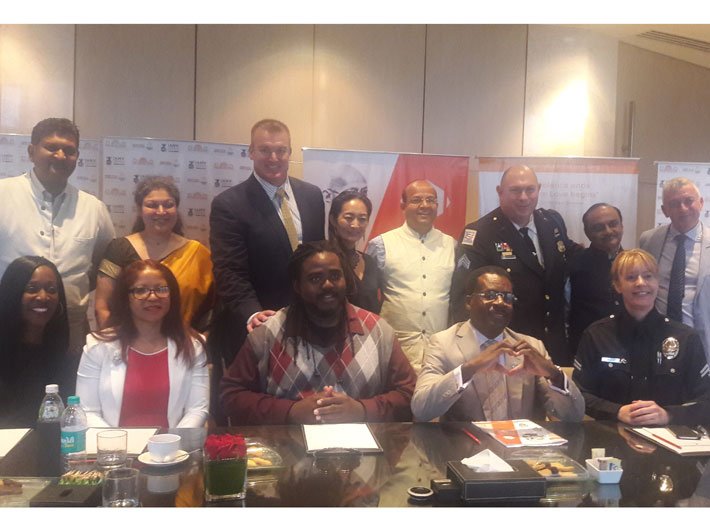Advancing technology has made the world a global village, but its basic foundation is being threatened by crime and mass violence which pose a threat to human existence. To reimagine the idea of compassion, adopt the Gandhian principles of non- violence and to address rising extremism in global society, experts from across the world are attending the World Summit on Countering Violence and Extremism in Mumbai and Bengalaru. Organized by International Association for Human Values in collaboration with the NGO, From India with Love, the meet will culminate on the 149th birth centenary of Mahatma Gandhi on October 2.
‘Mahatma Gandhi’s relevance has never been greater for America. In a world so full of violence, suffering and pain, it is time for each one of us to invest in learning the science of mindfulness and mediation and its application in healing and transformation. The job of the police is to enforce law and order and have compassion and the American police executives are here to study and implement the same ” said Mandar Apte, executive director, From India with Love .
“The summit will explore Gandhi’s principles of nonviolence and help police and community leaders to counter violence and extremism. We believe that this will create new opportunities to work with law enforcement leaders in the United States and abroad including Mexico, Canada and beyond and share ideas for advance policing and safety through science and innovation and to draw from their unique perspectives," said Chief (Ret) Jim Bueermann, President of the National Police Foundation.
“In the US we are working to change law enforcement like never before in history . Our citizens and political leaders are asking us to take new ways to engage with our community. My responsibility for our Chief of Police is to provide him with advice and counsel on new and innovative ways to engage community members and get the community partner with us. This is part of our building relationships with individuals and peace in neighborhoods” said Brett A Parson, Commander , Metropolitan Police Department , Washington D.C.
“In the US especially in urban environments we see a lot of violence. Every day as police officers we confront people are on drugs or those who have mental health issues. While we have our tools we need to find new ways to bring them down and engaging this way will help bring down crime” he added.
‘In Los Angeles as things are, every little thing that happens a finger is pointed at the police . This becomes very judgmental and very stressful and stops us to evolve and do our part. We need to find our responsibilities as a police department and as a community. In our department we are looking at innovation, creative techniques and ways to improve ourselves. Through meditation, yoga, self- care you create a less violent society added Julie Nony, Senior Lead Officer, Los Angeles Police Department.
Larry Juriga, Chief of Police, North Miami Police said in their area they are not only police officers but ‘peace’ officers. “While people see our tools like firearms and hand cuffs from outside, our most important tools are compassion, de-escalation and empathy which comes handy these days.”
Dr Smith Joseph, Mayor, City of North Miami, said that it is important to be connected with the environment, understanding different cultures and inculcating compassion.” Social injustice is ugly. We need equal opportunities for all and avoid friction. In the city on North Miami we ensure funding for social progress. Social problems lead to medical problems and vice versa. It is important to learn peoples cultures, why they behave the way they do. It is caring” he said.
He added that in North Miami when they were looking for the Chief of Police they wanted someone with human qualities of compassion and understanding as everyone is created equal and have the same basic human needs. “I don’t think there is better police to address the issue of non- violence than India," said Joseph.
Dr Frank Straub, Director of Strategic Studies and Centre for Mass Violence Response Studies at the National Police Foundation, Brazilian Commanders, former prisoners and experts from the field of education, research, law enforcement, civic bodies and policy from across the world and India are participating at the summit .



